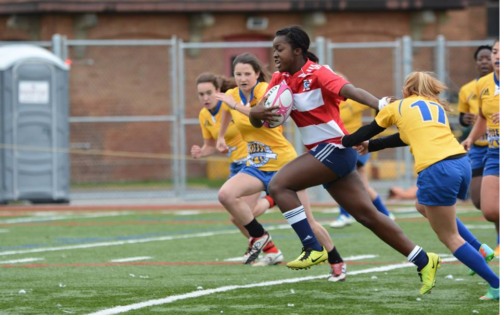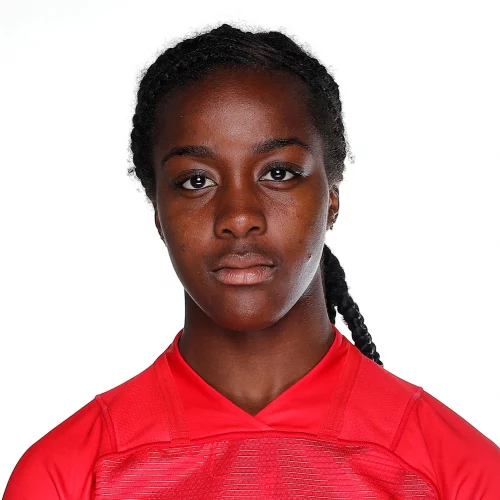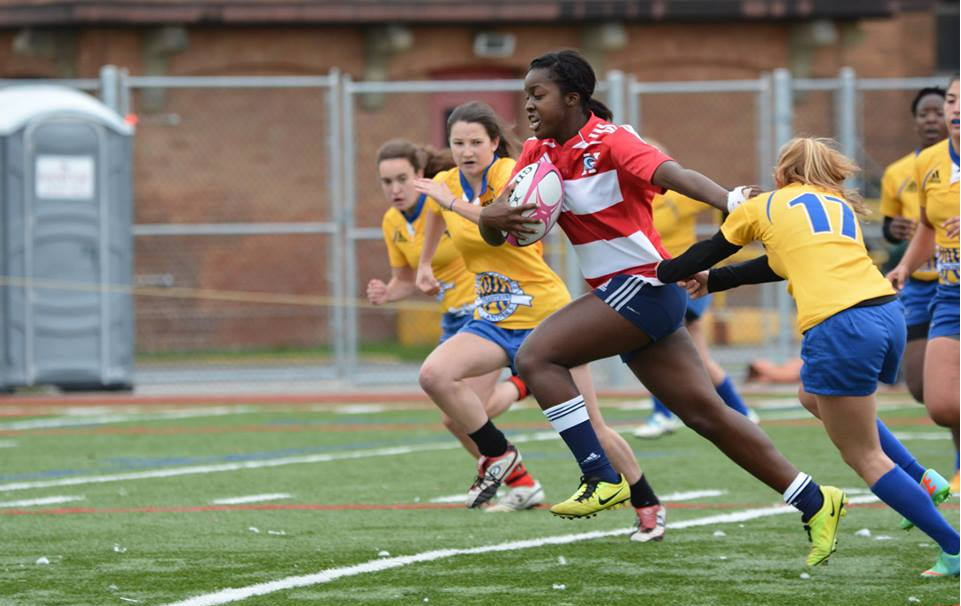Creating a positive sport environment: a conversation with Pamphinette Buisa
 When she was younger, people were always telling Pamphinette Buisa that she was too aggressive.
When she was younger, people were always telling Pamphinette Buisa that she was too aggressive.
She had tried out various sports like volleyball and basketball in elementary school, and she just didn’t seem to fit in. That’s when she discovered rugby, a sport where she was actually encouraged to hit people. She had been self-conscious about being tall, lanky and awkward, but on the rugby playing field she was celebrated for her strength and speed. It was a cathartic discovery for the young athlete.
“I was usually the only Black girl on the team, and I had long braids, so I was very different from the other players. For my parents, rugby wasn’t a conventional sport for their daughter to go into but I always had them supporting me. I was privileged to have people showing me where I could go next, from high school and then up the club level and on to provincials. They always saw talent, and saw me, and having someone in my corner who believed in me continued my love of the sport,” Buisa told Sport for Life.
It was the positive sport environment of her youth that allowed Buisa to succeed, ultimately making the national Rugby Canada 7s team, where she found a role as a forward in rugby sevens and a flanker in rugby fifteens. For six years she was given the chance to travel the world, competing at the World Cup, the Pan American Games and the University World Tournament. Finally she set her eyes on the Olympic Games, a goal that gave her purpose and passion.
But while all this was going on, she could also sense that something was fundamentally wrong.
Challenging colonial power structures
Buisa and her team made headlines last year after the ousting of their coach in April, a move that came after the team members unanimously came forward with allegations of bullying and abuse. Though he denied any wrongdoing, he was ultimately relieved from his position. Buisa feels that this outcome had more to do with structural issues within the organization than with the coach himself. She sees how the competitive nature of high performance sport makes it hard to not be pitted against one another.
 “The way it works is there are 21 players, and 12 get selected to go to international tournaments. So looking internally, as a team we saw that there was breakdown in our team culture because a lot of us didn’t have genuine relationships with one another beyond the field. It was a hard thing to realize: we don’t even like each other, so how can I stand in solidarity with you if I don’t know what you care about? What do you need from me to be a better teammate?” she said.
“The way it works is there are 21 players, and 12 get selected to go to international tournaments. So looking internally, as a team we saw that there was breakdown in our team culture because a lot of us didn’t have genuine relationships with one another beyond the field. It was a hard thing to realize: we don’t even like each other, so how can I stand in solidarity with you if I don’t know what you care about? What do you need from me to be a better teammate?” she said.
“And if we are in a culture that recreates harm, it’s time to shake up that structure. Whether we’re talking about coaches or players or administration, why don’t we give them the right tools to be in their power or check their power when they have it?”
Buisa and her teammates were inspired by the Black Lives Matter movement, and the general sense of growing social awareness that came before and was amplified during the pandemic. They had successfully created an internal sense of solidarity, but found the controversy swirling around the investigation into their coach’s departure distracting as they prepared for the Olympics. But nothing could have prepared them for what happened next — another Rugby Canada coach targeted them on social media while they were competing in Tokyo, in between games.
He wrote five tweets disparaging them.
“That was a real insight into the types of things we were dealing with. We were relaxing, putting music on between games, then we go online and find out someone from our own community is coming after us? It was so harmful and hurtful, not to mention distracting. We had news reporters contacting us, asking for our reaction, but we just had to turn off our phones and get back on the field,” she said.
That coach became the second person fired from the organization in less than a year.
Looking to the future of Rugby Canada
Buisa still wants to earn her gold medal, and plans to be at the next Olympics. In the meantime, the 24-year-old has begun to explore opportunities to speak about race, social awareness, and how best to create a decolonized sport organization based on the principles of the Long-Term Development in Sport and Physical Activity framework and the Indigenous Long-Term Participant Development Pathway. She appeared at the 2021 Virtual Sport for Life Canadian Summit to share some of her insights.
“I’ve always been passionate about learning, and very curious. I’m currently studying political science and social justice, seeing how these things intersect and overlap. Since I’ve been doing some consulting work with Decolonize Together, I see these structures everywhere. People tell me ‘just focus on the sport, don’t be an activist’ but my whole identity is resistance. It’s become a responsibility to use my voice in a conscious and responsible way,” she said.
“Not everybody has the privilege to do that.”
For Kabir Hosein, Sport for Life’s Director of Operations and Strategic Initiatives, the turmoil at Rugby Canada is a good example of the hard conversations that are being had all over the country. After being impressed by her presentation at the Summit, he followed the developments of her team with interest.
“This is an unprecedented time for the sport world. More than ever before, sport organizations are grappling with issues of equity, diversity, inclusion and accessibility. Problematic power structures are being dismantled and people who abuse their power are being held accountable, and that’s a good thing. The work Pamphinette and her team has done with Rugby Canada will ultimately benefit future players and the entire organization,” he said.
“As Canadians, we need to make sure these lessons don’t go to waste. We need to double down on our commitment to quality sport, which happens when good people, good places and good programs come together. With this in mind, we can all work towards a better future for everyone.”

